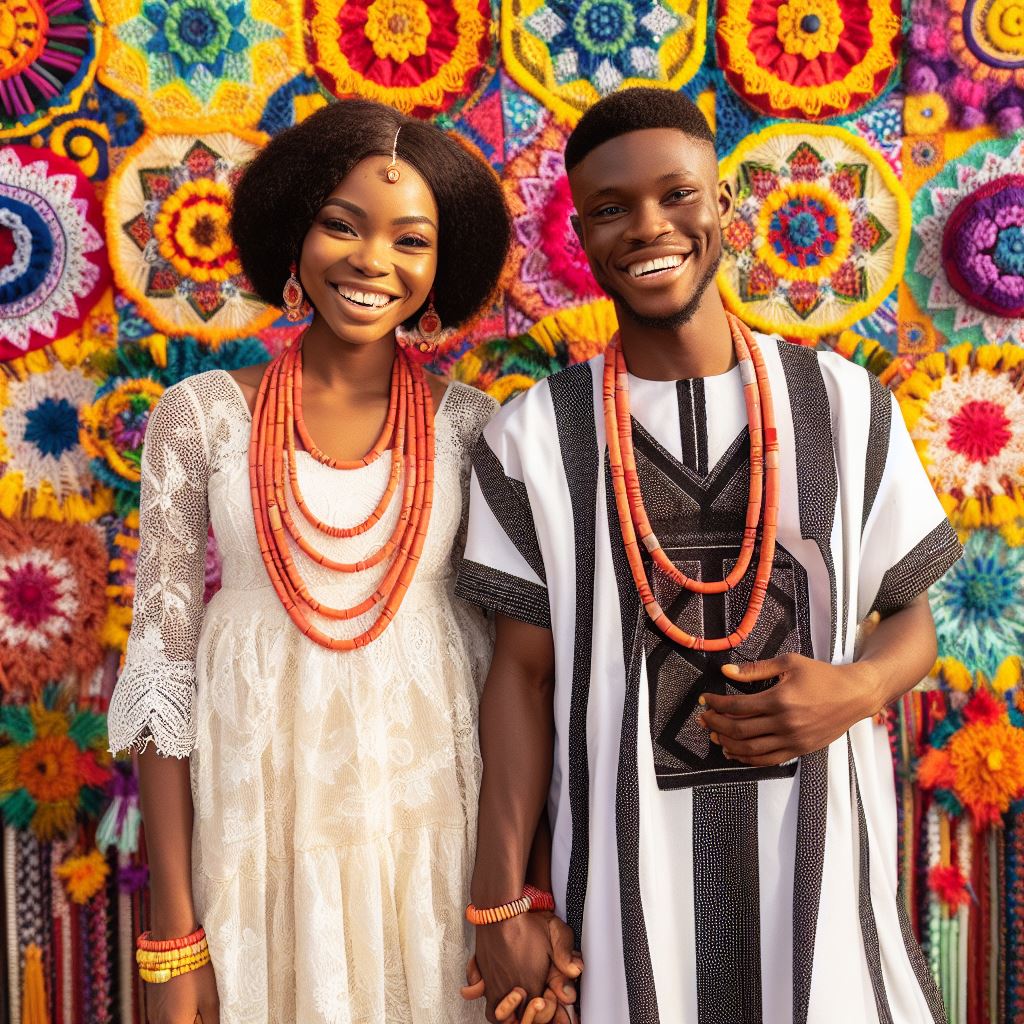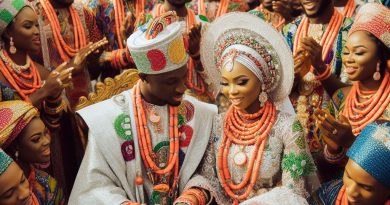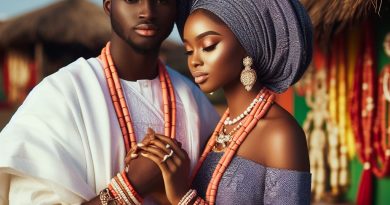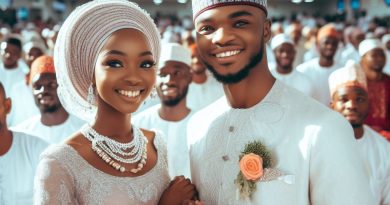Marriage Forms in Nigeria: A Comprehensive Guide for Couples
Last Updated on January 28, 2024
Introduction
Brief overview of marriage in Nigeria
Marriage in Nigeria is a significant aspect of the country’s culture and society.
Purpose of the blog post
The purpose of this blog post is to provide a comprehensive guide to marriage forms in Nigeria for couples.
Traditional Marriage Forms in Nigeria
Overview of traditional marriage practices in Nigeria
- In Nigeria, traditional marriages are deeply rooted in cultural and ethnic practices, reflecting the diversity of the country.
- These traditional marriage ceremonies are significant social events that bring families and communities together.
- Traditional marriages hold great importance, as they are seen as a way to preserve cultural heritage and maintain social cohesion.
Description of different traditional marriage forms
- Igbo traditional marriage: Igbo marriages are characterized by vibrant and elaborate ceremonies, symbolizing the joining of two families.
- Yoruba traditional marriage: Yoruba marriages are known for their rich cultural displays, with ceremonies that showcase the customs and traditions of the Yoruba people.
- Hausa traditional marriage: Hausa marriages often involve elaborate matchmaking processes, negotiations, and the exchange of gifts between families.
- Other ethnic groups’ traditional marriage forms: Nigeria is home to numerous ethnic groups, each with their unique traditional marriage practices, such as the Ibibio, Tiv, and Efik.
Rituals and customs involved in each traditional marriage form
- Igbo traditional marriage: Igbo traditional marriages involve several significant rituals, including the “Introduction” (ime ego), “Wine-Carrying” (ike aka), and “Taking the Bride Home” (iku aka).
- Yoruba traditional marriage: Yoruba traditional marriages feature rituals like the “Introduction” (mo mi mo e), “Engagement” (iku iya lewa), and the “Final Wedding Ceremony” (nikkai).
- Hausa traditional marriage: Hausa traditional marriages consist of rituals such as “Introduction” (kayan lefe), “Engagement” (fatiha), and the grand “Wedding Feast” (walima).
- Other ethnic groups’ traditional marriage forms: Each ethnic group has its unique rituals and customs, including the Ibibio “Courtship” (ede ako), Tiv “Bride Price Negotiation” (inshi mba), and Efik “Traditional Blessings” (eko ete).
These rituals and customs not only bind the couple together but also strengthen the bonds between families and communities.
Traditional marriage forms in Nigeria serve as a way to honor and preserve cultural traditions and pass them down to future generations.
They provide a platform for sharing values, beliefs, and customs while celebrating the union of two individuals.
Understanding and appreciating the diverse traditional marriage forms in Nigeria is essential for couples and communities to maintain their cultural heritage.
By upholding these practices, Nigerians can ensure the rich tapestry of their traditions remains intact, fostering unity and strength.
In summary, traditional marriage forms in Nigeria are diverse and vibrant, reflecting the country’s cultural richness.
Each form has its unique rituals and customs, which play a crucial role in bringing families and communities together.
By cherishing and celebrating these traditions, Nigerians ensure the preservation of their cultural identity and cohesion for generations to come.
Read: Digital Trends: Marriage Certificate Registration Online?
Civil Marriage Form in Nigeria
Explanation of the civil marriage system in Nigeria
- The civil marriage system in Nigeria is a legal and secular form of marriage recognized by the government.
- It allows couples to have a union outside of religious customs and formalities.
- Unlike traditional and religious marriages, civil marriages are governed by the Marriage Act of Nigeria.
- They offer couples a modern and legally binding way to solemnize and protect their relationship.
Requirements and procedures for obtaining a civil marriage certificate
To obtain a civil marriage certificate in Nigeria, couples must meet certain requirements:
- Both parties must be at least 21 years old, or have parental consent if under the legal age.
- They must be mentally and physically capable of entering into a marriage.
- Couples must both be present during the marriage registration process.
- They must provide valid identification documents, such as passports or birth certificates.
- A notice of marriage must be given at the local marriage registry at least 21 days before the intended wedding date.
- During the marriage registration, couples must declare their intent to marry and sign the marriage register in the presence of witnesses.
- After the ceremony, a civil marriage certificate will be issued, which serves as legal proof of the union.
Legal rights and responsibilities of couples in a civil marriage
A civil marriage in Nigeria grants couples certain legal rights and responsibilities:
- Spouses have the right to own property individually or jointly and can inherit from each other.
- They have the right to make legal decisions for each other and act as next-of-kin in medical emergencies.
- Couples are responsible for supporting and providing for each other and any children of the marriage.
- They have the right to access the court system for divorce or dissolution of the marriage.
- Spouses are entitled to certain benefits, such as pension and social security, depending on the jurisdiction.
- They are legally bound to uphold the obligations and duties outlined in the Marriage Act.
- Divorce or separation in a civil marriage follows specific legal procedures and may require court intervention.
A civil marriage in Nigeria offers couples the flexibility to marry outside of religious constraints while providing legal recognition and protection.
It ensures that their union is formalized and governed by the Marriage Act, granting them various rights and responsibilities.
By following the required procedures, couples can obtain a civil marriage certificate, solidifying their commitment in the eyes of the law.
Read: Children & Marriage-Based Citizenship: What You Should Know
Islamic Marriage Form in Nigeria
Overview of Islamic marriage practices in Nigeria
- Islamic marriages are a significant part of Nigeria’s cultural and religious fabric.
- They are governed by Islamic customs and laws, which have a deep influence on the process.
- In Nigeria, Islamic marriages occur between Muslims who follow the teachings of the Quran.
- These marriages are recognized as legal and valid under Nigerian law.
- Islamic marriage practices in Nigeria differ from other forms of marriage in the country.
- Islamic marriages emphasize the importance of consent, compatibility, and mutual respect.
- They encourage individuals to select suitable partners based on religious beliefs and values.
- The process of an Islamic marriage involves various steps that follow religious traditions closely.
- Islamic marriages highlight the role of the family in the union of the couple.
- Family members play a crucial role in facilitating the marriage negotiations and formalities.
- Islamic marriages in Nigeria are a union not only between two individuals but between two families.
Steps involved in an Islamic marriage ceremony
- The first step in an Islamic marriage is the proposal, initiated by the groom or his family.
- If the proposal is accepted, both families meet to discuss the terms of the marriage.
- The families then agree upon the Mahr, a compulsory gift from the groom to the bride.
- The next step is the Nikah ceremony, where the marriage contract is signed by the couple.
- The couple agrees to the conditions stated in the contract, which safeguards their rights.
- After the contract is signed, the marriage is solemnized in the presence of witnesses.
- The Imam, or a religious leader, conducts the ceremony and offers prayers for the couple.
- Following the prayers, the couple exchanges vows and rings as a symbol of their commitment.
- The ceremony concludes with blessings and well wishes from family and friends.
- The couple then begins their married life and embarks on their journey together.
Role of Islamic customs and laws in shaping Islamic marriages in Nigeria
- Islamic customs and laws guide every aspect of an Islamic marriage, ensuring adherence to religious principles.
- These customs play an essential role in determining the rights and responsibilities of the couple.
- Islamic laws promote equality, fairness, and respect within the marriage.
- They outline the rights of both spouses, emphasizing mutual support and cooperation.
- Islamic customs also provide a framework for resolving conflicts and maintaining marital harmony.
- They encourage open communication, forgiveness, and patience among couples.
- Islamic laws prohibit practices such as forced marriages, polygamy without consent, and domestic abuse.
- The role of Islamic customs and laws is to foster healthy, fulfilling, and enduring marriages.
- Islamic marriages in Nigeria uphold the sanctity of the union and prioritize the well-being of the couple.
- These customs and laws contribute to the overall stability and success of Islamic marriages in Nigeria.
Overall, Islamic marriages in Nigeria hold great significance and are deeply rooted in religious and cultural traditions.
The process involves various steps that highlight the importance of consent, family involvement, and adherence to Islamic customs.
By following the teachings of Islam, Nigerian couples forge strong and harmonious unions that serve as the foundation for a lifelong partnership.
Read: Ensuring a Smooth Process: Tips for Marriage Citizenship

Christian Marriage Form in Nigeria
Explanation of Christian marriage practices in Nigeria
- Christianity plays a significant role in Nigerian society, including marriage practices.
- Christian marriages are based on the principles and teachings of the Bible.
- The ceremony typically takes place in a church and is officiated by a pastor or priest.
- Christian couples are expected to follow certain guidelines and traditions during their marriage.
Different types of Christian marriage ceremonies
- Catholic wedding: In this ceremony, the couple receives the sacrament of marriage, and it is considered a sacred union.
- Protestant wedding: This ceremony varies among different denominations, but it often involves exchanging vows and rings.
- Pentecostal wedding: Pentecostal weddings are known for their lively worship and emphasis on spiritual gifts.
- Anglican wedding: Similar to Catholic weddings, Anglican ceremonies also focus on the sacrament of marriage.
Importance of Christian values and beliefs in Nigerian marriages
- Christian values lay the foundation for a strong and lasting marriage in Nigerian culture.
- The belief in the sanctity of marriage encourages couples to uphold their vows and remain faithful.
- Christian teachings promote love, forgiveness, and humility, which are essential for a successful marriage.
- Nigerian couples often seek guidance from their religious leaders and use prayer as a means to strengthen their marriage.
Christian marriage in Nigeria is deeply rooted in religious beliefs and values. Nigerian couples find strength and guidance in their faith as they navigate the challenges of married life.
Whether it’s a Catholic, Protestant, Pentecostal, or Anglican wedding, the ceremony serves as a public declaration of their commitment to each other and to God.
By adhering to Christian teachings, Nigerian couples strive to build a harmonious and fulfilling marital relationship.
Read: Financial Implications of Marriage-Based Citizenship in Nigeria
Delve into the Subject: The Impact of Infidelity: Healing After Betrayal
Combining Multiple Marriage Forms in Nigeria
Couples practicing hybrid marriage forms
- Hybrid marriage forms involve combining different cultural and religious practices in a single ceremony.
- Many couples in Nigeria opt for hybrid marriage forms to honor their diverse backgrounds.
- This practice allows couples to incorporate traditions and customs from both sides of the family.
- It can also foster a sense of unity and inclusivity among different cultural and religious groups.
- Hybrid marriage forms require careful planning and coordination between the couple and their families.
Challenges and benefits of combining multiple marriage forms
- Combining multiple marriage forms can present challenges due to differing customs and rituals.
- Some families may have conflicting traditions, which can lead to tension and disagreements.
- Language barriers and misunderstandings can arise when blending different cultural practices.
- On the other hand, combining multiple marriage forms can bring richness and diversity to the ceremony.
- Couples can celebrate their individuality and create a unique wedding experience.
- Blending different marriage forms can also promote cultural understanding and respect.
Examples of couples who successfully blended traditional, civil, Islamic, and Christian marriage forms:
- Ada and Tunde had a wedding ceremony that incorporated Yoruba traditional, civil, and Christian marriage customs.
- They performed a traditional engagement ceremony, had a civil wedding at the registry, and later exchanged vows in a church.
- Aisha and Hassan combined Islamic and Christian marriage forms to celebrate their diverse heritage.
- They had a Nikah ceremony followed by a Christian wedding where they exchanged vows and rings.
- Chika and Michael decided to blend Igbo traditional, civil, and Islamic marriage forms in their wedding.
- They had an Igbo traditional ceremony, registered their marriage legally, and also performed a Nikah ceremony.
Combining multiple marriage forms allows Nigerian couples to embrace and honor different cultures and traditions.
While it can present challenges, the benefits of celebrating diversity and promoting understanding outweigh the difficulties.
Examples of couples successfully blending traditional, civil, Islamic, and Christian marriage forms demonstrate the beauty and inclusivity of such unions.
By incorporating various customs, couples can create a wedding that is meaningful, unique, and reflective of their identities.
Conclusion
Recap of the different marriage forms in Nigeria
Overall, Nigeria has a rich and diverse range of marriage forms that couples can choose from based on their personal preferences and cultural backgrounds.
To recap, we explored the various marriage forms, including Christian, Islamic, Customary, and Civil marriages. Each has its own set of requirements and rituals that couples need to follow.
Encouragement for couples to choose the marriage form that suits them best
- It is important for couples to carefully consider and choose the marriage form that best aligns with their beliefs, values, and traditions.
- They should also consult with their families and seek legal advice to ensure all necessary legal requirements are met.
- The decision to choose a marriage form is a personal one, and there is no right or wrong choice.
- Couples should prioritize open communication, mutual respect, and compromise when making this decision to build a strong and fulfilling marital relationship.
Closing thoughts on the diversity of marriage practices in Nigeria
- In closing, the diversity of marriage practices in Nigeria is a testament to the rich cultural heritage of the country.
- It is important to celebrate and embrace this diversity, while also recognizing the importance of unity, love, and understanding in all marriages, regardless of the chosen form.
- By understanding and respecting the different marriage forms, couples can navigate the complexities of marriage in Nigeria with grace and wisdom, ensuring a harmonious and fulfilling union.


